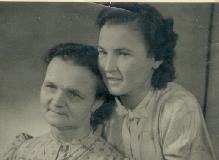Rita's Story
War
 It was 1943 and Germany had been at war four years. So far, Breslau had been untouched.
We had no air raids and no food shortages. In fact, life was good. Of course we
had ration books, but we seemed to be short of nothing. None of my brothers drank
or smoked. They'd send their pay home for mum, but she wouldn't take a penny. She
put it all in the bank for them.
It was 1943 and Germany had been at war four years. So far, Breslau had been untouched.
We had no air raids and no food shortages. In fact, life was good. Of course we
had ration books, but we seemed to be short of nothing. None of my brothers drank
or smoked. They'd send their pay home for mum, but she wouldn't take a penny. She
put it all in the bank for them.
I was old enough by now, to work in the factory after school. It was the first time I became aware of all the different races. People were speaking many different languages. I was very interested and had lots of fun trying to make myself understood.
We had an ace flyer in Germany. He had shot down many planes and was awarded many medals including the laurels. One day we were told he had been shot down. There was a state funeral. The flags were flying at half mast. The streets were crowded with people. The coffin was draped with a flag and pulled by a gun carriage. Sometime later we heard a different story.
The flyer (whose name I don't remember) refused to go on a suicide mission. He said it was useless because Germany was losing the war, so he was sent to a concentration camp for being a traitor, and there, he was built into a wall. True of false, I don't know, but it was told by someone who actually worked on the building site. After we heard of the loss in Stalingrad, the talk of war became quite serious. We now know that that was the turning point of the war.
The Germans were not fighting the Russian soldier any more, but the Mongolians, and most of all, the Siberian winter. No-one but the Mongols could withstand that. They were wild and had no mercy for anyone or anything. They rode horses bareback and existed on raw.horse meat. It was Russia's ace card against the invaders. The Germans were halted 12km before Moscow. With their supply lines cut off and no food, clothing or ammunition, the weather and the Mongols, things were really bad. Men were dying by the thousands. The lucky ones were already dead. The suffering beyond endurance. The men's only thought and hope was to get back to the West. Millions never made it.
Even after the war, many were never allowed to return. My eldest brother was one of a handful who did make it back. He was in the army from the beginning, but never ranked higher than corporal. He was not seeking glory, but fighting to stay alive. His only reward are frost-bitten feet, ulcers and a brain disorder. He won't talk about the war. I have asked many times.Günter did not fare too badly. He recovered his health, and because his apprenticeship kept him outside in all kinds of weather, it made him hardy and he did manage. Many of his friends are buried in Russia. People more used to a heated environment did not survive. He worked in a factory in the Urals where he met a girl and fell in love. Once a week he was allowed out for visits. He was helped a lot by her parents with food and clothing. After four years he received his papers to return to Germany. It was 1947. Günter's friend, older than himself, was very ill, so my brother made him take the papers and return while he remained behind until his friend's papers arrived. Two more years went by before the release papers came. My brother wanted to bring his girlfriend with him, but that was not allowed. neither could he get permission to marry her and stay behind.
In 1949, after six years as a Prisoner of War, he was put on a train for Germany.
Me and Mum 1943
 When he came to visit us on leave, my eldest brother bought a wedding ring from them.
It was pure gold. My mother bought furniture and china. Just before Christmas
1943, my mother heard heavy footsteps going upstairs. Although very frightened herself,
she went to see what was going on. When she realised is was the secret police, she
knew what had to be done. My youngest brother Georg's place of work was only five
minute's walk away. Mum sent me with a note to him saying to hurry and fetch Mrs
Spiller from the factory. She arrived just in time to meet her sister and children
coming down the stairs. They met on our floor level. At least they saw each other
once more and were able to travel together because the end of the war was not that
far away. I pray that they made it. I often wondered.
When he came to visit us on leave, my eldest brother bought a wedding ring from them.
It was pure gold. My mother bought furniture and china. Just before Christmas
1943, my mother heard heavy footsteps going upstairs. Although very frightened herself,
she went to see what was going on. When she realised is was the secret police, she
knew what had to be done. My youngest brother Georg's place of work was only five
minute's walk away. Mum sent me with a note to him saying to hurry and fetch Mrs
Spiller from the factory. She arrived just in time to meet her sister and children
coming down the stairs. They met on our floor level. At least they saw each other
once more and were able to travel together because the end of the war was not that
far away. I pray that they made it. I often wondered.
It was in the following spring of 1944 that Georg was sent to France with the army. After only six moths' service, his best friend was killed and he himself was taken Prisoner of War and sent to Scotland. At least he was safe. Our biggest worry was Günter. Still only 21 years of age, wounded and in Russia.
The block that was our home until January 1945